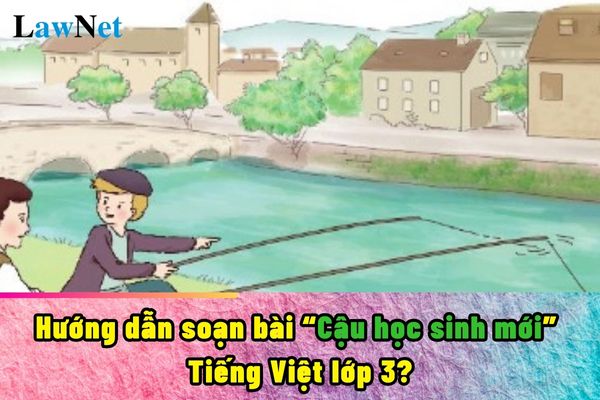What are guidelines on preparing the lesson Cậu học sinh mới for grade 3 students in Vietnam? Are grade 3 students in Vietnam assessed consistently according to Circular 27?
What are guidelines on preparing the lesson Cậu học sinh mới for grade 3 students in Vietnam?
"Cậu học sinh mới" in the grade 3 Vietnamese Language textbook is one of the lessons for grade 3 students. This text is located on pages 24, 25, 26 of Volume 1, Lesson 1 of Chân trời sáng tạo curriculum
Please refer to the guidelines on preparing the lesson Cậu học sinh mới for grade 3 students as follows:
|
Guidelines on preparing the lesson Cậu học sinh mới for grade 3 students * Main content of the text: |
*Note: Information is for reference only./.

What are guidelines on preparing the lesson Cậu học sinh mới for grade 3 students in Vietnam? Are grade 3 students in Vietnam assessed consistently according to Circular 27? (Image from the Internet)
Are grade 3 students in Vietnam assessed consistently according to Circular 27?
Based on Article 2 of Circular 27/2020/TT-BGDDT, the evaluation of primary students are implemented as follows:
- From the 2020-2021 school year for Grade 1.
- From the 2021-2022 school year for Grade 2.
- From the 2022-2023 school year for Grade 3.
- From the 2023-2024 school year for Grade 4.
- From the 2024-2025 school year for Grade 5.
Thus, from the 2024-2025 school year, the evaluation of grade 3 students at the primary level will be uniformly implemented according to Circular 27.
What are regulations on the periodic assessment of primary students at the end of the year in Vietnam?
The regulations on the periodic assessment of primary students at the end of the year are stipulated in Article 7 of the Regulation on Assessment of primary students issued with Circular 27/2020/TT-BGDDT:
- Periodic assessment of learning content in subjects and educational activities
+ At the end of the school year, subject teachers base their assessments on regular evaluations and the required achievements, specific manifestations of each component competency of each subject, and educational activity to evaluate students for each subject and educational activity according to the following levels:
++ Outstanding Achievement: effectively meets learning requirements and frequently demonstrates specific manifestations of each component competency of the subject or educational activity;
++ Achieved: meets learning requirements and demonstrates specific manifestations of each component competency of the subject or educational activity;
++ Not Achieved: does not meet some learning requirements or does not demonstrate specific manifestations of each component competency of the subject or educational activity.
+ At the end of the school year, for mandatory subjects: Vietnamese Language, Mathematics, Foreign Language 1, History and Geography, Science, Informatics, and Technology have periodic tests;
+ Periodic test questions are designed to meet the required achievements and specific manifestations of each component competency of the subject, including questions and exercises designed according to the following levels:
++ Level 1: Recognizing, recalling, or describing learned content and directly applying it to solve familiar situations and issues in learning;
++ Level 2: Connecting, arranging some previously learned content to solve similar issues;
++ Level 3: Applying learned content to solve some new issues or making reasonable responses in learning and life.
+ Test papers are corrected by teachers with comments, graded on a 10-point scale, no decimal points, and returned to students. The periodic test scores are not used for comparing students with one another.
If the results of the end-year test are unusual compared to regular assessments, the teacher can propose to the school for the student to retake another test to accurately evaluate the student’s learning outcomes.
- Periodic assessment of the formation and development of qualities and competencies
At the end of the school year, the homeroom teacher cooperates with co-teachers through comments, manifestations during regular assessments of the formation and development of each student's core competencies and essential qualities to evaluate according to the following levels:
+ Good: Meets educational requirements well, clear and frequent manifestations.
+ Satisfactory: Meets educational requirements, but not frequent manifestations.
+ Needs Improvement: Does not fully meet educational requirements, unclear manifestations.

